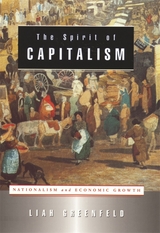
"Center" is a commonly used term with a variety of meanings. According to editors Liah Greenfeld and Michel Martin, "center" carries a twofold meaning when used as a concept. In its first sense, it is a synonym for "central value system," referring to irreducible values and beliefs that establish the identity of individuals and bind them into a common universe. In its second sense, "center" refers to "central institutional system," the authoritative institutions and persons who often express or embody the central value system. Both meanings imply a corresponding idea of "periphery," referring both to the elements of society that need to be integrated and to institutions and persons who lack authority.
The original essays compiled in this volume examine and apply the concept of the center in different contexts. The contributors come from a broad range of disciplines—classics, religion, philosophy, history, literary criticism, anthropology, political science, and sociology—which serves to underscore the far-reaching significance of the Shilsean theory of society. The interrelated subsets of the "center-periphery" theme addressed here include: symbolic systems, intellectuals, the expansion of the center into the periphery, parallel concepts in the work of other scholars besides Shils, and the paths of research inspired by these concepts. The volume features an introspective essay by Shils himself, in which he reexamines his central ideas in the light of new experiences and the ideas of others, some of them contained in this volume.
By drawing together such diverse scholars around a unified idea, this collection achieves a cohesion that makes it an exciting contribution to the comparative analysis of social and cultural systems. A collective effort in social theory, Center: Ideas and Institutions is a testimony to the breadth and complexity of one of man's ideas.

It’s the American dream—unfettered freedom to follow our ambitions, to forge our identities, to become self-made. But what if our culture of limitless self-fulfillment is actually making millions desperately ill? One of our leading interpreters of modernity and nationalism, Liah Greenfeld argues that we have overlooked the connection between egalitarian society and mental illness. Intellectually fearless, encompassing philosophy, psychology, and history, Mind, Modernity, Madness challenges the most cherished assumptions about the blessings of living in a land of the free.
Modern nationalism, says Greenfeld, rests on bedrock principles of popular sovereignty, equality, and secularism. Citizens of the twenty-first century enjoy unprecedented freedom to become the authors of their personal destinies. Empowering as this is, it also places them under enormous psychic strain. They must constantly appraise their identities, manage their desires, and calibrate their place within society. For vulnerable individuals, this pressure is too much. Training her analytic eye on extensive case histories in manic depression and schizophrenia, Greenfeld contends that these illnesses are dysfunctions of selfhood caused by society’s overburdening demands for self-realization. In her rigorous diagnosis, madness is a culturally constituted malady.
The culminating volume of Greenfeld’s nationalism trilogy, Mind, Modernity, Madness is a tour de force in the classic tradition of Émile Durkheim—and a bold foray into uncharted territory. Often counter-intuitive, always illuminating, Mind, Modernity, Madness presents a many-sided view of humanity, one that enriches our deepest understanding of who we are and what we aspire to be.

Nationalism is a movement and a state of mind that brings together national identity, consciousness, and collectivities. It accomplished the great transformation from the old order to modernity; it placed imagination above production, distribution, and exchange; and it altered the nature of power over people and territories that shapes and directs the social and political world. A five-country study that spans five hundred years, this historically oriented work in sociology bids well to replace all previous works on the subject. The theme, simple yet complex, suggests that England was the front-runner, with its earliest sense of self-conscious nationalism and its pragmatic ways; it utilized existing institutions while transforming itself. The Americans followed, with no formed institutions to impede them. France, Germany, and Russia took the same, now marked, path, modifying nationalism in the process.
Nationalism is based on empirical data in four languages—legal documents; period dictionaries; memoirs; correspondence; literary works; theological, political, and philosophical writings; biographies; statistics; and histories. Nowhere else is the complex interaction of structural, cultural, and psychological factors so thoroughly explained. Nowhere else are concepts like identity, anomie, and elites brought so refreshingly to life.

The Spirit of Capitalism answers a fundamental question of economics, a question neither economists nor economic historians have been able to answer: what are the reasons (rather than just the conditions) for sustained economic growth? Taking her title from Max Weber's famous study on the same subject, Liah Greenfeld focuses on the problem of motivation behind the epochal change in behavior, which from the sixteenth century on has reoriented one economy after another from subsistence to profit, transforming the nature of economic activity. A detailed analysis of the development of economic consciousness in England, the Netherlands, France, Germany, Japan, and the United States allows her to argue that the motivation, or "spirit," behind the modern, growth-oriented economy was not the liberation of the "rational economic actor," but rather nationalism. Nationalism committed masses of people to an endless race for national prestige and thus brought into being the phenomenon of economic competitiveness.
Nowhere has economic activity been further removed from the rational calculation of costs than in the United States, where the economy has come to be perceived as the end-all of political life and the determinant of all social progress. American "economic civilization" spurs the nation on to ever-greater economic achievement. But it turns Americans into workaholics, unsure of the purpose of their pursuits, and leads American statesmen to exaggerate the weight of economic concerns in foreign policy, often to the detriment of American political influence and the confusion of the rest of the world.
READERS
Browse our collection.
PUBLISHERS
See BiblioVault's publisher services.
STUDENT SERVICES
Files for college accessibility offices.
UChicago Accessibility Resources
home | accessibility | search | about | contact us
BiblioVault ® 2001 - 2025
The University of Chicago Press









